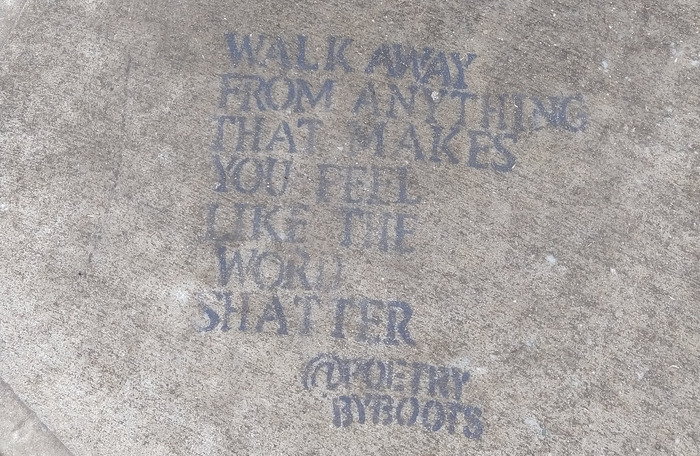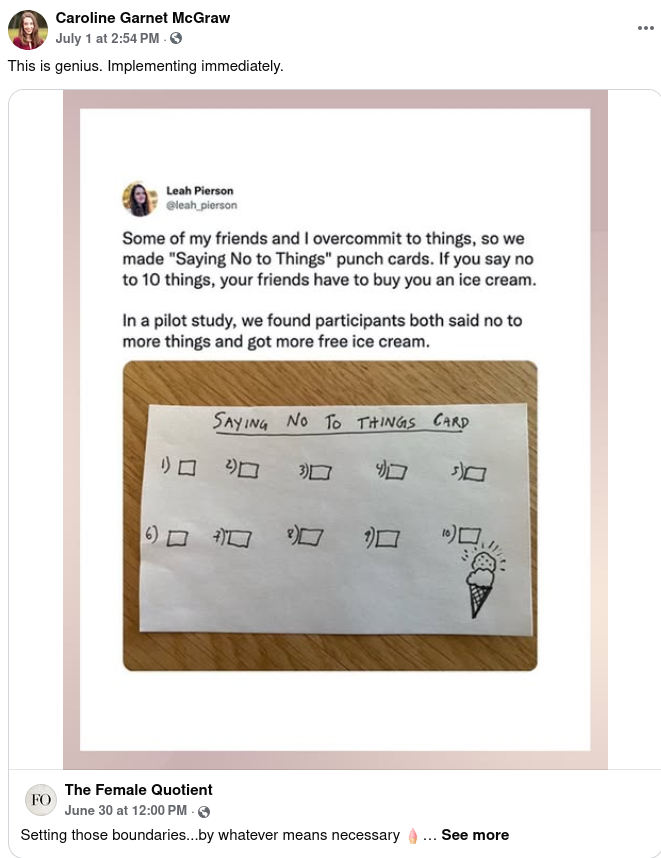One weekend at the local splash pad, I had a conversation with a friend and fellow mom while our kids played. When I asked about her job as an administrator at a private school, she told me that she’s actually had trouble giving scholarship money away.
When she offered funds to a mom with multiple children enrolled, the mom thanked her, but insisted that she couldn’t receive the funding. Surely someone else needed it more. Surely she ought to self-sacrifice.
My friend sighed. She didn’t say as much, but I could sense the subtext in her words: This family needed the funding. But they wouldn’t accept it.
“It’s great that our families are generous and think of others,” she said. “But it was so frustrating! I wanted her to have these funds. They go away if they don’t get used. Maybe I just didn’t communicate well.”
“Ah,” I said. “You’re good at communicating. I’m guessing you bumped up against the old story that being a good person means needing as little as possible. That receiving help means you’ve failed.”
She nodded. “Gosh, yes. It’s so ingrained, especially in mothers.”
“I used to think like that too,” I said, “But at some point this past year or so, I finally saw how foolish it was not to receive all help that is offered.
My dad surfs, so this is the metaphor that comes to mind. Good surfers catch most waves on their own. They paddle out, no problem. But at a certain point, that system breaks down.
If the waves get big enough, they can’t paddle out. Or rather, they can, but it’s dangerous. They could die just trying to get to big waves in open ocean. So they get towed in by another person with a jet ski.
As my family and I have been in big waves, I have learned to receive tow ins. I now accept help when it’s offered. Anything else is denying reality. Living in denial is dangerous, for surfers and for me.”

My new friend said loved that image of big wave surfers getting towed in. And perhaps another mom nearby overheard us, because she started offering her help!
When my kid needed another towel, she offered us her extra one; when I was struggling with a bathing suit, she offered to hold the towel up for privacy. (Needless to say, I said yes.)
What are examples of self-sacrifice?
Now, dear reader, let’s talk about you. Have you been reluctant to ask for help, even though you could really use it? Have you been pretending to be unaffected by big waves, even as keeping your head above water takes all your energy? All of these are examples of self-sacrifice.
If you tend to be a “helper,” heads-up – that’s prime self-sacrificing territory. Many of my coaching clients tend to have intense “helping” jobs (think doctors, nurses, and therapists).
Often they also have significant caregiving responsibilities; they’re raising kids, perhaps, or supporting family members with disabilities.
They’re so good at helping that they keep getting more responsibilities. And as the responsibilities pile on, the pressure mounts. So much to juggle, so little time. And yet … there’s still this yearning.
There’s this feeling of life tugging at their sleeves, pointing them in a new direction. Go here! Make this creative project! Start that business! Pursue that path!
If this is you, then you know what comes next: we stop ourselves. We rule out the yearning. The limiting story goes that we cannot possibly care for ourselves while fulfilling our responsibilities.
So we self-sacrifice yet again. That’s what a good person does, isn’t it? But trying so hard to be “a good person” is making us miserable.
Let me give you a specific example. I once had a coaching client who was a severely burnt-out mom of three young adult children, two of whom had significant care needs.
She told me, “I’m tired of the same story, the same limiting beliefs. It’s like I’m thrashing in the ocean; I’m so tired. I try to float, but the waves keep crashing. Why am I not on a boat out here? Or why do I not turn around, swim to shore, and rest on the sand?”
Just by saying that, she was beginning to break the old self-sacrificing pattern. She was questioning the paradigm that kept her stuck. Through our work, this soul-weary woman found a way to rest on the sand, both literally and figuratively.
Right away, we helped her get a breather from the big waves that had been engulfing her. She freed up her time and started pursuing what she loved, rather than just what she was “supposed to” do.
She then blazed through a training course, finishing early and getting certified for a new career she loved. Then she and her husband went on a month-long holiday to an island in Australia – her dream location!
Last I heard, her husband had a job offer to work on the island and they were considering moving there full-time.
When we began coaching, she felt stuck at the mercy of the waves. By the time we ended, she had learned how to steer her ship.
How did she do it? The nutshell version of the process goes like this:
- Notice that you are feeling miserable. Be honest with yourself about this.
- Decide that you are going to take steps, however small, to feel lighter and freer.
- Get some immediate rest and downtime, in whatever way is doable for you in this season. (This will feel uncomfortable. Truths you’ve been avoiding will rise to the surface; let them.)
- During this time, zoom out and look at your life from up above. What’s working? What’s not? What would you like to do less of? Maybe you need to quit your job, or tell your mother that she cannot stay with you for a month over the holidays.
- Begin subtracting the stuff that makes you suffer. (Yes, this will be nerve-wracking – a therapist or coach can help, but in the end, it’s down to you to act. And yes, at times it feels risky to live your truth. But risk is baked into the equation in this life. There’s no avoiding it. And, it’s probably even more risky to keep going down a path that isn’t on purpose for you.)
That’s just a quick overview; to see the exact steps we took to free up my client’s time (and address the very real practical challenges she faced), enter your email address below to receive the Sacred Circle Exercise.
This one exercise has helped my coaching clients save years of their lives and tens of thousands of dollars. What could it do for you? Let’s find out.
Free Up Time to Pursue Your Purpose with the Sacred Circle exercise!
What is it called when someone is self-sacrificing?
It’s called being a martyr — and eventually, that turns into being an exploding doormat. Someone who’s constantly in self-denial grows resentful; naturally, this impacts her relationships. The more she sacrifices herself for others, the less they value her — because she doesn’t value herself!
Remember, we teach people how to treat us. If we are constantly throwing ourselves under the bus and living the lie that our needs don’t matter, if we don’t respect ourselves, is it any wonder that others eventually lose respect for us too?
As David Seabury wrote way back in the 1930’s in The Art of Selfishness:
Have you ever noticed this mysterious contradiction: that those who toil unmercifully for others lose the love of those for whom they sacrifice? It is not only a fact but a fulfillment of a law. People love us for what we are. As we disappear under the burdens they put on us, they unconsciously blame us for the loss of our charm which the burdens create.
What are the dangers of self-sacrifice?
You may understand this (and want to avoid it) in principle, even as you’re wondering what it looks like in practice. Here’s an example I see a lot: Overly-responsible readers and coaching clients sticking with jobs they know aren’t right for them, because they believe that’s what a “good” person does.
They stay in these dead-end jobs for months, years, even decades past the point when they want to go. They feel more resentful, more angry, more trapped with each passing year. Deep down they know that they’re squandering precious time – time that could be used to live on purpose.
To me, this is the biggest danger of self-sacrifice: a) losing your sense of self, your feeling of internal freedom, and b) losing precious time.
Contrast that with the advice I got from my paternal grandfather growing up: “If you have a job that you really don’t like … quit! And go find one that you do like.”
He wasn’t speaking flippantly. On the contrary: My grandfather survived the hell that was World War II, and he and my grandmother had seven children to support. When he quit jobs he didn’t like, he faced very real risks. But he also understood the risks of NOT changing.
In essence, he told me, “Don’t sacrifice your soul on the altar of supposed to. Don’t go living someone else’s life. Don’t act like it’s okay to spend your life doing work you despise. Instead, figure out how to live and work in a way that feels meaningful and on purpose for you.”
But how many people actually take that wise advice? How many of us persevere for decades, doing things we simply don’t like? Why do we think there’s a virtue in this? Why don’t we just quit already, and find something that we DO like?
Well, because deep down we haven’t given ourselves permission to live on purpose. But what if that’s about to change? Here, now, today, we can decide: No more. I will never betray my heart.

Florence graffiti; it reads, “I will never betray my heart.”
Of all the concepts I’ve shared over the years, one that resonates with many readers is that of going through life “one down.” Living “one down” means that we view other adults as being one level up from us. Their decisions, needs, and preferences exist on a higher plane than ours.
They have more rights and privileges than we do. They are allowed to get angry and have boundaries. But us? Nope, we’re not allowed. We’re supposed to be good girls who sacrifice ourselves for the good of everyone else!
If you use phrases such as, “I’m not allowed,” “I’m supposed to,” or “I don’t want to get in trouble” … that’s a good indicator that you’ve been living as a one-down good girl rather than a grown woman.
Often there’s a sense of shame that comes when we notice this pattern. What’s wrong with us? How embarrassing! Why don’t we just step up already? It’s not that simple, though. Growing up, we never learned the ONE crucial skill that would help us to live as equals.
Let me tell you about it in the form of a story.
Little kids have a big fight
One weekend I was trying to leave the house with my two kids, ages four and two, so we could go to a playground. Finally we made it to the back door, where they got into a scuffle about who would go outside first.
When we got the door opened, my two year old raced out ahead of her big sister. Upon “losing” to her little sister, my older girl burst into tears. My two year old was triumphant at first, then distraught; soon both were wailing.
My initial response to this was not ideal. Fueled by a combination of sensory overload and daylight savings time sleep deprivation, I said, “Kids! No! We are not doing this now! Come on! Seriously! This is so … SILLY!”
Predictably, this judgment did not help the situation. Both girls kept on wailing. So with a sigh, I dropped the resistance, along with the hope that we would get to the playground. I also dropped my body to sit on the ground at eye level with them.
I turned to my four year old first. “OK, let’s start over. I can see you’re upset, honey. Would you tell me, why are you upset?”
“Because SHE got in front of me! She ALWAYS gets to go first!”
“Yes, she did get in front of you this time. You usually go first, so that sounds hard.”
“I wanted to go first! And she got in FRONT of me!”
“Yes, she did get in front of you. And you’re feeling upset. I hear you! I’m sorry it’s hard for you right now.”
“Well … but … it’s not YOUR fault, Mommy! It’s HER fault!”
I suppressed a smile. “Sometimes it’s hard to take turns with your sister, isn’t it?”
She nodded and stepped closer to me. At this point I could feel her anger deflate, so I turned to my littlest and repeated the process with her: Get curious, ask a question, repeat back what I heard, be a compassionate witness (no fixing or changing).
Within moments, the girls were happily racing off to play together.
The one crucial skill that helps you start living as an equal
Now let’s talk about you.
Where are you telling yourself, “This is silly!” rather than listening to how you feel?
Where are you assuming you know the answer, rather than getting curious?
Where are you judging yourself, instead of having compassion for yourself?
Growing up, we were taught to be kind to others. That’s a good thing! But most of us were not taught dual empathy – the ability to be kind to both ourselves AND others.
And when we’re not taught to be good to ourselves, our growth gets stunted. It’s like a plant that doesn’t get enough water; it may survive, but it can’t thrive.
But what if you learned to give yourself what you need? What if you learned to be a compassionate witness to your own suffering? This is the one crucial skill that helps you to stop living “one down” and start living as an equal. It’s the nourishment you need to heal and grow.
What is self-sacrifice according to the Bible?
Let me take a moment to talk to the religious readers out there, who may be at once intrigued and very uncomfortable with this post. The idea of sacrificing less sounds amazing, sure, but is it really “right”?
Here’s my take. While it’s true that many New Testament verses do glorify self-sacrifice, it’s worth noting that the people writing these New Testament letters were all men, and spiritual growth and evolution looks different depending who’s on the journey.
In patriarchal societies, spiritual growth looks different for those socialized as men than it does for those socialized as women.
I love how my favorite coach and author Dr. Martha Beck once spoke about this topic in an interview with Steve Barlett.
She described how those who are socialized as men in our patriarchal culture are taught to take what they want, to focus on themselves and their personal achievements. For these folks, the growth edge is to learn to work together as a team, to consider others, not just themselves.
(In other words, it tracks that those New Testament writers were talking so much about self-sacrifice … because as men, they were not taught to live that way!)
For those of us socialized as women, however, things look very different. From our earliest days, we’ve been taught to consider others, to be nice, to please and appease. As such, our growth edge is to learn to to consider ourselves, not just others!
Furthermore, how is it helpful to “love your neighbor as yourself” – as Jesus famously advised – if you do not actually love yourself at all?! The logic breaks down.
That said, you might be wondering about one of the most quoted “sacrifice yourself” verses, Matthew 10:38-39, where Jesus is recorded as having said:
“And he who does not take his cross and follow after me is not worthy of me. He who finds his life will lose it, and he who loses his life for my sake will find it.”
On one hand, it’s easy to read this as a call to sacrifice the self. On the other hand, we can also read this as a call to sacrifice everything that is not the true self / the true path. My read is that Jesus is calling people into a life of honesty and integrity.
He’s calling people to put off falsehood and embrace the truth of who they are … just as, in another passage, he refers to himself as “the way, the truth, and the life.”
I don’t read this as a self-aggrandizing statement; rather, I believe he was saying, “I am now so deeply connected to the way, the truth, and the life that flows through everything, so as to be virtually indistinguishable from it … and I invite you to do the same.”
This also dovetails with Jesus’s assertion that “you will do greater things than these.” He’s fine with not being top dog! He’s not interested in it! Rather, he’s calling people toward a place where there are no hierarchies, a place like the open field Rumi famously described centuries later:
“Out beyond ideas of wrongdoing and rightdoing, there is a field. I’ll meet you there.”

Nashville graffiti; “Walk away from anything that makes you feel like the word shatter.” @Poetrybyboots
Stop self-sacrifice with a simple exercise
Last year I got sick and felt wretched. Once the fever abated, I didn’t re-introduce my morning green tea. Going without caffeine seemed like the “right” thing to do.
A few days in, I spoke with my dear friend, fellow coach, and fellow cult survivor Lisa Kohn. She asked about my health, so I told her about the fever and how I’d quit green tea. I was trying for positive but sounded like Eeyore: miserable and martyred.
Thankfully, Lisa called me out. She asked why, exactly, I’d given up the tea. Had my doctor told me to? (No.) She questioned whether I was better off without it.
Immediately, I felt freer, lighter, and more expansive. I recognized the truth in an instant: I didn’t want to give up my daily mug of tea … and I didn’t have to!
I said, “You know what? I’m so glad you asked me that. The truth is that I miss my tea! It works well for me. I just defaulted to that old religious programming that it’s always better to sacrifice.”
Lisa understood. Both of us were taught from childhood to give up everything for high-demand religion. Both of us were told to put our basic needs – for safety, food, and human connection – on the altar to God.
I spent my first few decades trying to be the best person I could possibly be. She was always someone who wasn’t me. This was the cause of 90% of my stress, suffering, and time scarcity: the deep-seated belief that who I was, wasn’t good.
I had to prove myself again and again; hence, the overwork and overgiving. It was all a compensation for the original sin of being me.
After that conversation with Lisa, though, I remembered that all of that was BS. I felt so energized that I decided to go out and break some more of my own rules.
My first act of deliberate defiance was to take my kids out for ice cream. (They were thrilled.) Then I took it to the next level and ordered my own cone! That might not sound like a big deal to you, but it was for me. After years of “righteous eating” it was a big win to enjoy that rare treat with my kids.
I felt so much joy, sitting in that booth. I felt so much love for my kids, and for life itself. It was so freeing to break out of the box I’d put myself in.
Galvanized, I issued this challenge to each of my private coaching clients:
Step 1:
Look at where you feel constricted or trapped.
Notice what you’re believing about this aspect of your life.
Step 2:
Break a rule that’s been fencing you in.
Do something very different from what you’d normally do. Say no. If this is difficult, start a reward system!

(Credit to @leah_pierson for the fabulous idea and photo, from this post. Thanks to The Female Quotient for sharing it.)
Step 3:
Tell me about it, so that we can celebrate together!
My clients did a great job breaking their internal rules. They challenged beliefs from, “You’re not allowed to have nice pajamas” to, “You’re not allowed to fall in love again.”
I bet you can see where this is going. Now, let’s talk about YOU.
What are you struggling with right now? What internal rule do you wish you could break? What’s stopping you from setting yourself free?
Leave a comment below with your answers. I’m here and I’m listening, and I’ll do my very best to help.
Why? Because freedom is even sweeter than ice cream.
Share This:
Comments
Related Posts


